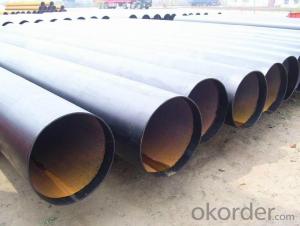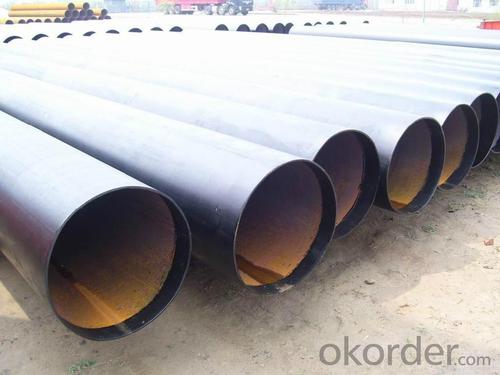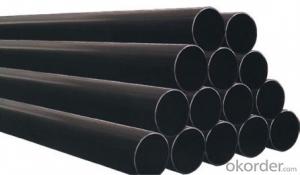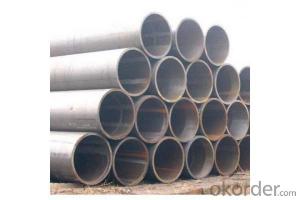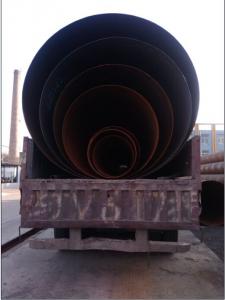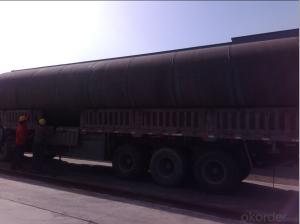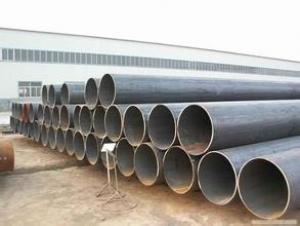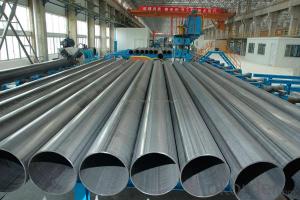26'' CARBON STEEL LSAW WELDED PIPE API/ASTM/JIS/DIN
- Loading Port:
- Tianjin
- Payment Terms:
- TT OR LC
- Min Order Qty:
- 5 m.t
- Supply Capability:
- 300 m.t/month
OKorder Service Pledge
OKorder Financial Service
You Might Also Like
Packaging & Delivery
Packaging Detail: | standard export packing or as customer's requirement |
Delivery Detail: | within 10 - 30 days |
Specifications
Spiral Welded Steel Pipes and Tubes
1.Material:Q195-Q235
2.Length:1-12m
3.WT:1.0-14mm
4.O.D.:20-273mm
Product Description:
1.Material : Q235,Q345,L245,L290,L360,L415,L450,L485,GrB,X42,46,X52,X56,X60,X65,X70,X80,X100
2,Standard: SY/T5037-2000,GB/T9711-2011,API Spec 5L PSL1/PSL2,ASTM A252\A53,ISO3183,DIN17172,EN10217,JIS G3457,AWWA C200,ASTM A139,ASTM A671,ASTM A672
3.Wall thickness: 3.0mm-30mm
4.Outer diameter: φ168mm-3020mm
5,Length: 5m-12m or as your requirement
6,Corrosion protection standard: DIN30670,DIN30671, AWWAC210, AWWA C203, SY/T0413-2002,SY/T0414-2002
7,Application: Oil, gas, natural gas, water pipe, thermal electricity pipe, steel structure engineering, etc
Q195-q345 Material Steel Pipe's Materials
Elements | Chemical Compsition% | Mechanical Property | ||||||
C% | Mn% | S% | P% | Si% | Yield Point (Mpa) | Tensile Strength(Mpa) | Elongation | |
Q195 | 0.06-0.12 | 0.25-0.50 | <0.050< span=""> | <0.045< span=""> | <0.030< span=""> | >195 | 315-430 | 32-33 |
Q215 | 0.09-0.15 | 0.25-0.55 | <0.05< span=""> | <0.045< span=""> | <0.030< span=""> | >215 | 335-450 | 26-31 |
Q235 | 0.12-0.20 | 0.30-0.70 | <0.045< span=""> | <0.045< span=""> | <0.030< span=""> | >235 | 375-500 | 24-26 |
Q345 | <0.20< span=""> | 1.0-1.6 | <0.040< span=""> | <0.040< span=""> | <0.55< span=""> | >345 | 470-630 | 21-22 |
Packaging & Delivery
Packaging Detail: | Normal exporting packing,in container or bulk vessel or as per clients' request |
Delivery Detail: | 2 months after confimed contract |
Specifications
Large Diameter API 5L X70 PSL2 LSAW Steel Pipe
Grade: X42, X46, X50, X52, X60, B, C
OD: 1.5"-28"
WT: SCH10-SCH160
Brand:TPCO
Large Diameter API 5L X70 PSL2 LSAW Steel Pipe
Specifications:
u Standard: API 5L
u Grade: B, C, X42, X46, X50, X52, X56, X60, X65, X70, X80
u OD: 1.5"-28"
u WT: SCH10-SCH160
u Length: 5-12m
u Ends Finish: plain end, bevel end, grooved end
u Surface Treatment: bare, black varnished, oiled finish, red color, anti-corrosion, 3PE, FBE or epoxy coating
u Technique: hot rolled or cold drawn
u Application: api 5l steel pipe for conveying oil, water, gas
u Invoicing: based on theoretical weight or actual weight
u Payment Terms: L/C at sight, T/T or Western Union
u Trade Terms: FOB, CFR, CIF
u Certification: ABS manufacturing assessment, ABS design assessment, API 5CT, API 5L, DNV manufacturer certificate, ISO9001 quality management system certificate, ISO14001 environment management system certificate, GB/T28001 occupational health and safety management system certificate, A1 class manufacturing license of special equipment certificate, CCS, GL, LR, SGS, TüV, PDE
- Q: How are steel pipes used in the construction of dams and water reservoirs?
- Steel pipes find widespread application in the construction of dams and water reservoirs owing to their remarkable durability, strength, and capacity to endure heavy loads and high pressure. These pipes serve multiple indispensable functions within the realm of dam and reservoir construction. A primary utility of steel pipes in these structures lies in their capacity to transport water. They are employed to convey water from its source, such as a river or stream, to the reservoir or dam. These pipes are engineered to withstand the elevated water pressure, ensuring a consistent flow of water to the reservoir. The durability of steel pipes enables them to remain intact even in the harshest environmental conditions. In addition to water conveyance, steel pipes are also utilized for drainage purposes. They are employed to establish drainage systems that help regulate the water level within the reservoir or dam. These pipes are strategically positioned to control the water flow and prevent potential flooding or overflow. Steel pipes are also integrated into the construction of spillways and outlets in dams and reservoirs. Spillways are designed to release excess water from the reservoir during heavy rainfall or when the water level exceeds predetermined thresholds. Steel pipes are employed in crafting these spillways to provide a controlled pathway for water discharge, thus averting any harm to the dam or surrounding areas. Moreover, steel pipes are employed in the construction of penstocks, which are large conduits that transport water from the reservoir to turbines in hydropower plants. The pressure generated by the water within these pipes propels the turbines, facilitating electricity generation. The robustness and durability of steel pipes are vital in ensuring the smooth and efficient operation of hydropower plants. All in all, steel pipes occupy an indispensable role in the construction of dams and water reservoirs. Their durability, strength, and ability to withstand high pressure render them an ideal choice for various aspects of these structures, including water transportation, drainage systems, spillways, and penstocks.
- Q: What is the production process of seamless steel tube?
- The main production process for hot rolling seamless steel tube (the main inspection):Tube preparation and check delta to billet heating, heating, rolling, perforated pipe, steel pipe and heat treatment, diameter (minus) Delta to finished tube straightening, finishing and inspection of delta (nondestructive, physicochemical, Taiwan inspection and warehousing)
- Q: What are the different methods of coating steel pipes?
- There are several methods of coating steel pipes, including fusion bonded epoxy (FBE) coating, polyethylene (PE) coating, polyurethane (PU) coating, and cement mortar lining. These coatings are applied to protect the steel pipes from corrosion, increase their lifespan, and improve their performance in various applications.
- Q: How do you calculate the pipe deflection for steel pipes?
- To calculate the pipe deflection for steel pipes, you need to consider factors such as the length, diameter, material properties, applied load, and support conditions. The most common method is using structural analysis software or referring to relevant engineering codes and standards, which provide formulas and calculation procedures specific to steel pipes. These calculations determine the deflection at various points along the pipe, considering its stiffness and the applied loads.
- Q: Are steel pipes suitable for underground irrigation pumping?
- Indeed, steel pipes prove to be a fitting option for underground irrigation pumping. Renowned for their robustness and resilience, steel pipes present themselves as an optimal selection for subterranean utilities. They boast the capacity to endure substantial pressure, ward off corrosion, and remain less susceptible to soil shifting or fluctuations in temperature. Moreover, steel pipes exhibit a lengthier lifespan when juxtaposed with alternative materials, thereby mitigating the necessity for frequent replacements. However, it remains imperative to guarantee meticulous coating or lining of the steel pipes to avert corrosion and to consistently examine and uphold them for their continued efficacy and durability.
- Q: Can steel pipes be used for nuclear power plants?
- Yes, steel pipes can be used for nuclear power plants. Steel pipes are commonly used in the construction of nuclear power plants for various purposes such as transporting coolant, steam, and other fluids. Steel pipes offer excellent strength, durability, and resistance to high temperatures and pressure, making them suitable for the demanding conditions of nuclear power plants.
- Q: Are metal spiral tubes the same as metal bellows?
- The spiral pipe is mainly used in the pipeline of petroleum and natural gas, and its specifications are indicated by outer diameter * wall thickness.
- Q: What industries typically use steel pipes?
- Steel pipes are widely used in various industries due to their durability, strength, and versatility. Some of the industries that typically utilize steel pipes include: 1. Construction: Steel pipes are extensively used in the construction industry for various applications such as structural support, plumbing, and underground piping systems. They are commonly used in commercial buildings, residential structures, bridges, and tunnels. 2. Oil and gas: The oil and gas industry heavily relies on steel pipes for drilling, transporting, and distributing oil and gas. Steel pipes are used in offshore drilling rigs, oil refineries, natural gas processing plants, and pipelines to ensure the safe and efficient transport of these valuable resources. 3. Water and wastewater: Steel pipes play a crucial role in providing clean water supply and managing wastewater. They are used in water treatment plants, desalination facilities, and municipal water distribution systems. Steel pipes are also utilized for sewage and stormwater management. 4. Manufacturing: Various manufacturing industries employ steel pipes for specific applications. For instance, automobile manufacturers use steel pipes in exhaust systems, fuel lines, and hydraulic systems. Steel pipes are also used in the manufacturing of machinery, equipment, and appliances. 5. Mining: The mining industry requires strong and durable materials for its operations. Steel pipes are used in mining applications such as conveying materials, ventilation systems, and underground infrastructure. They are particularly useful in transporting minerals, ores, and other mining byproducts. 6. Energy and power: Steel pipes are extensively used in power generation facilities, including thermal power plants, nuclear power plants, and renewable energy installations. They are utilized in steam pipelines, cooling systems, and heat exchangers. Steel pipes are also employed in the construction of transmission lines for electricity distribution. 7. Infrastructure and transportation: Steel pipes are essential for infrastructure development and transportation systems. They are used in the construction of roads, bridges, railways, and airports. Steel pipes are also utilized in the transportation of fluids and gases, such as in pipelines for natural gas or petroleum products. Overall, the versatility and reliability of steel pipes make them indispensable in a wide range of industries, contributing to various aspects of our modern infrastructure and daily lives.
- Q: How do you calculate the pipe thermal expansion coefficient for steel pipes?
- The pipe thermal expansion coefficient for steel pipes can be calculated using the formula: α = (L2 - L1) / (L1 * (T2 - T1)) Where: α is the pipe thermal expansion coefficient L1 is the initial length of the pipe L2 is the final length of the pipe T1 is the initial temperature of the pipe T2 is the final temperature of the pipe. This formula takes into account the change in length and the change in temperature to determine the coefficient of thermal expansion for steel pipes.
- Q: Can steel pipes be used for oil refineries?
- Yes, steel pipes can be used for oil refineries. Steel pipes are commonly used in oil refineries due to their high strength, durability, and resistance to corrosion. They can handle the high pressure and temperature requirements of the oil refining process, making them suitable for transporting and distributing various petroleum products within the refinery.
Send your message to us
26'' CARBON STEEL LSAW WELDED PIPE API/ASTM/JIS/DIN
- Loading Port:
- Tianjin
- Payment Terms:
- TT OR LC
- Min Order Qty:
- 5 m.t
- Supply Capability:
- 300 m.t/month
OKorder Service Pledge
OKorder Financial Service
Similar products
Hot products
Hot Searches
Related keywords
